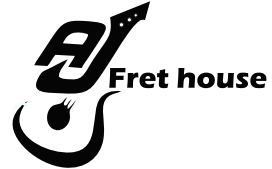C# Chord

Standard C# Major Chord Shape
Here’s the finger positioning:
- Index Finger: Place on the 4th fret of the e string (1st string).
- Ring Finger: Place on the 6th fret of the A string (5th string).
- Pinky Finger: Place on the 6th fret of the D string (4th string).
- Middle Finger: Place on the 5th fret of the G string (3rd string).
Strum across the bottom 4 strings, avoiding the top 2 strings.

Standard C# Major Chord Shape (Barre Chord)
The C# major chord is usually played as a barre chord on the 4th fret. Here’s the finger positioning:
- Index Finger: Barre across all the strings on the 4th fret.
- Ring Finger: Place on the 6th fret of the A string (5th string).
- Pinky Finger: Place on the 6th fret of the D string (4th string).
- Middle Finger: Place on the 5th fret of the G string (3rd string).
Ensure that your index finger presses down firmly on all strings to get a clear sound.
& Strum across the bottom 5 strings, avoiding the 6th string.
Tips for Playing the C# Guitar Chord
- Proper Barre Technique: Press down with the side of your index finger rather than the flat, as this offers more control and pressure.
- Finger Strength: Practice holding the barre and positioning your fingers on the frets without strumming. This helps build the muscle memory and strength you’ll need.
- Thumb Positioning: Position your thumb on the back of the guitar neck, directly behind your index finger. This gives you leverage and helps with barre chords.
- Practice in Sections: First, try only the barre with your index finger, then gradually add the ring, pinky, and middle fingers.
- Alternate Fingering Options: For a simpler version, try only pressing the three top strings (G, B, and high E strings) on the 4th fret to produce a partial C# chord.
Alternative C# Chord Shapes
- C# Major (Power Chord): Play the 4th fret on the A string and the 6th fret on the D and G strings. This simplified version avoids a full barre and is often used in rock and pop music.
